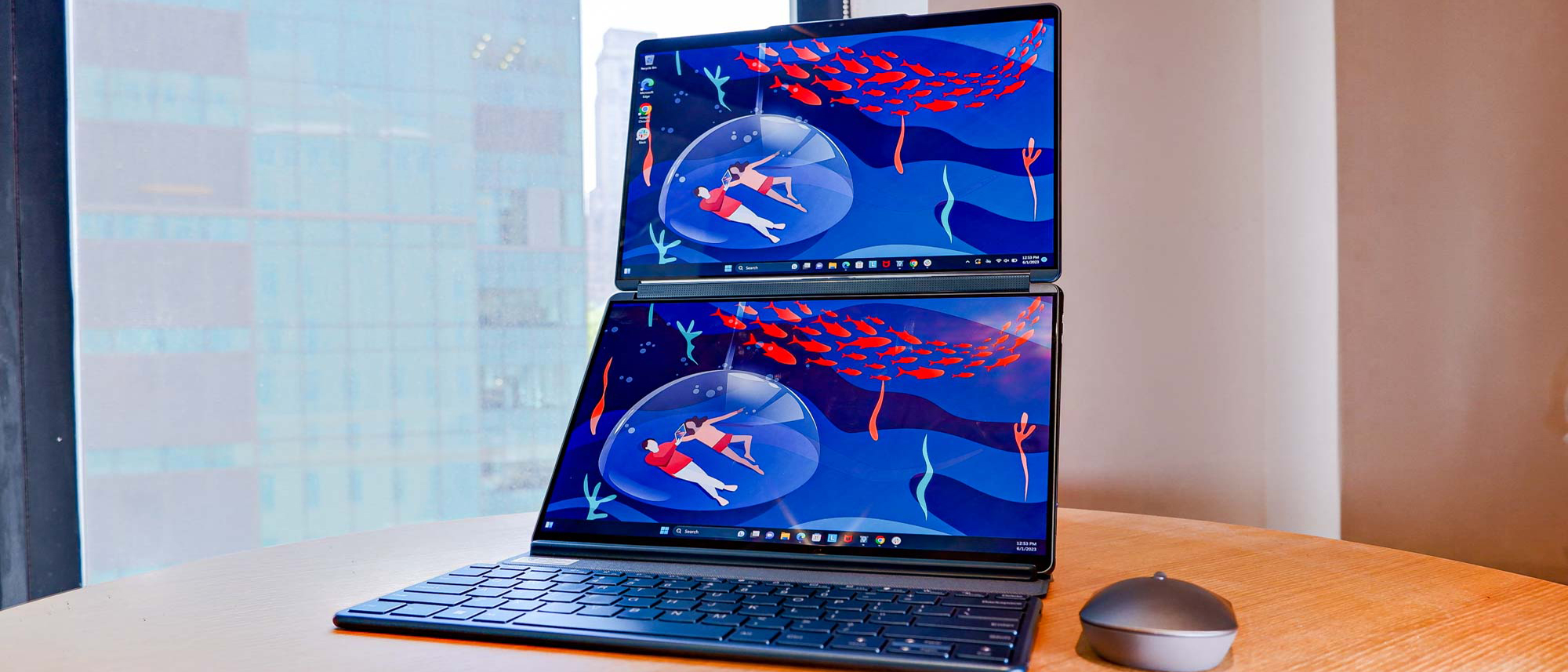Tom's Guide Verdict
The Yoga Book 9i is a compelling alternative to foldable screen laptops because it gives you two 13-inch displays in one package you can use in multiple modes. There are some clever software gestures and multitasking features here, too. But the starting price is very high.
Pros
- +
Dual OLED displays enable multiple modes
- +
Responsive touchscreens
- +
Bundled with Bluetooth mouse and attachable keyboard
Cons
- -
Priced higher than other 2-in-1 laptops
- -
Minimal ports
Why you can trust Tom's Guide
The Lenovo Yoga Book 9i ($1,999) could start a trend for 2-in-1 laptops. It could also be an expensive gimmick.
Uniting two 13.3-inch OLED displays in one device, the Yoga Book 9i offers a bevy of different usage modes meant to boost your productivity. This notebook can function as a traditional Windows 11 laptop or tablet, plus it can go into tent mode for presentations. Thanks to the included folio kickstand, you can use the Yoga Book 9i with two displays stacked on top of each other or spread the two panels side by side. If you’re not keen on typing on a touchscreen, you can use the included attachable Bluetooth keyboard.
The Yoga Book 9i is a Swiss Army knife of a laptop given all its modes. Though it’s expensive at $1,999, it offers enough singular value to earn a place on our best laptops, best 2-in-1 laptops and best Windows laptops lists. In addition to its unique design, it packs enough power for work and everyday computing. Its 13.3-inch 2.8K OLED displays also deliver sharp picture quality.
While the Lenovo Yoga Book 9i is expensive, it’s one of the most unique devices I’ve ever tested and has become my favorite laptop of 2023 so far. Find out why in my full review.
Lenovo Yoga Book 9i review: Specs
| Price | $1,999 |
| CPU | 13th gen Intel Core i7-1355U |
| Displays | Two 13.3-inch 2.8K (2,800 x 1,800) OLED, 60Hz |
| RAM | 16GB |
| Storage | 512GB |
| GPU | Intel Irix Xe |
| Ports | 3 USB-C Type-C (Thunderbolt 4) |
| Camera | Full HD IR+RGB |
| Size | 11.78 x 8.03 x 0.63 inches |
| Weight | 2.95 pounds |
Lenovo Yoga Book 9i review: Release date and price
- Priced at $1,999
- Includes Bluetooth peripherals and a folio stand
The Lenovo Yoga Book 9i releases on June 16 for $1,999. You can pre-order it now from Best Buy.
This laptop includes two 13.3-inch 2.8K (2,800 x 1,800) OLED touch displays, a 13th gen Intel Core i7-1355U laptop CPU, 16GB of RAM and 512GB of SSD storage space. Our review unit features the same specs since there are no other configurations.
The Yoga Book 9i comes bundled with a number of useful accessories. This includes a Bluetooth mouse and keyboard, along with a folio cover for the latter, doubling as a kickstand to prop the laptop up. You’ll also get a stylus.
Lenovo Yoga Book 9i review: Design
- Unique dual-screen design
- Offers multiple modes
The Yoga Book 9i features a dual-screen design that commands attention. Measuring 11.78 x 8.03 x 0.63 inches, this laptop is on the thick side. At 3.04 pounds, it’s also a tad heavy. While this could turn some folks off, I felt the Yoga Book 9i’s size and weight made it feel like a premium product.
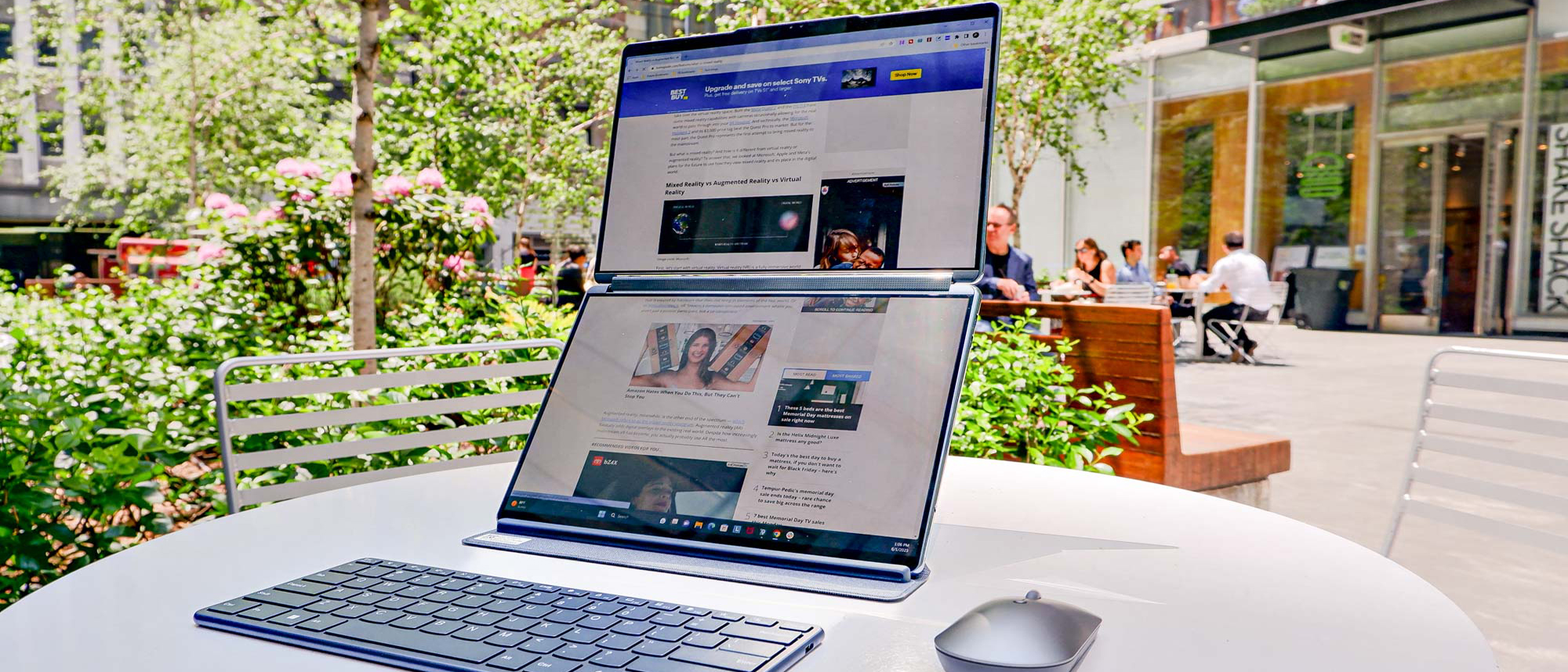
The all-aluminum unibody build and Tidal Teal color also gives the laptop a premium feel. Its surface is smooth and great to hold. Thanks to its sturdy build, I felt comfortable carrying it around when it was closed — either in my bookbag or around the office. With the exception of an etched Yoga logo and a Lenovo stamp on the lid, the Yoga Book 9i is free of adornments. The minimalist design is fetching.
I had no problems opening the laptop thanks to the small lip on the lid. The hinge is somewhat rigid when opening and closing the device, but not overly so. Flipping the lid back to use the laptop in tablet mode is also seamless. Despite its rigidity, the hinge opens and closes smoothly without creaking. The strong hinge prevented the lid from accidentally closing when I repositioned the laptop from dual landscape and dual portrait modes.
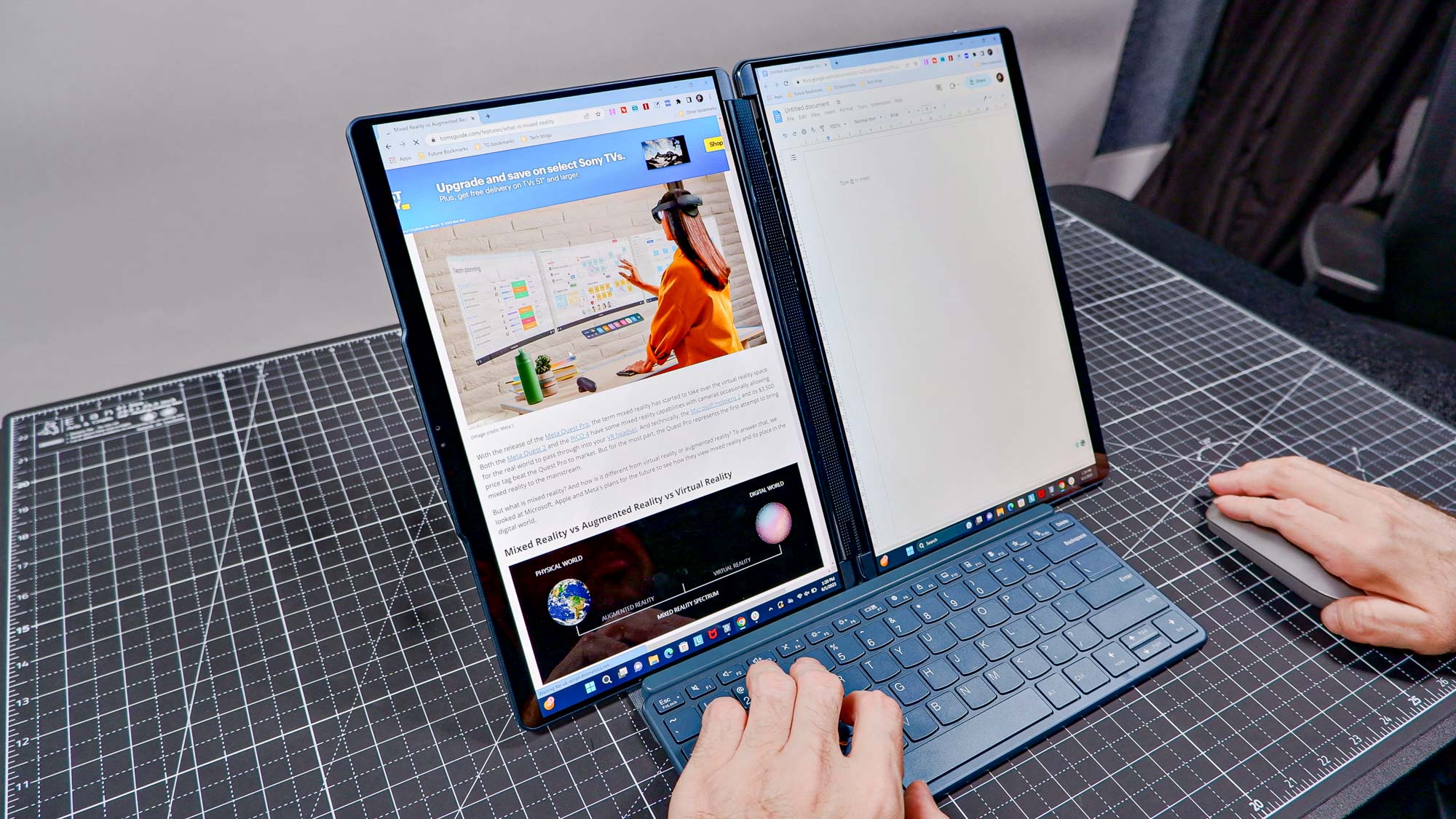
You can utilize both screens to read digital books. That sounds good conceptually but doesn’t work so well in practice. While the Yoga Book 9i isn’t overly heavy, it’s too bulky to function as a comfortable e-reader. You’re better off with one of the best Kindles. Still, I commend Lenovo for including this option since it makes use of the dual-screen design.
Lenovo Yoga Book 9i review: Ports
- Only three USB-C ports
The Yoga Book 9i doesn’t have a generous amount of ports, which is disappointing. There’s a lone USB-C port on the left side of the device. Over on the right you’ll find two other USB-C ports, along with a webcam shutter and the power button.
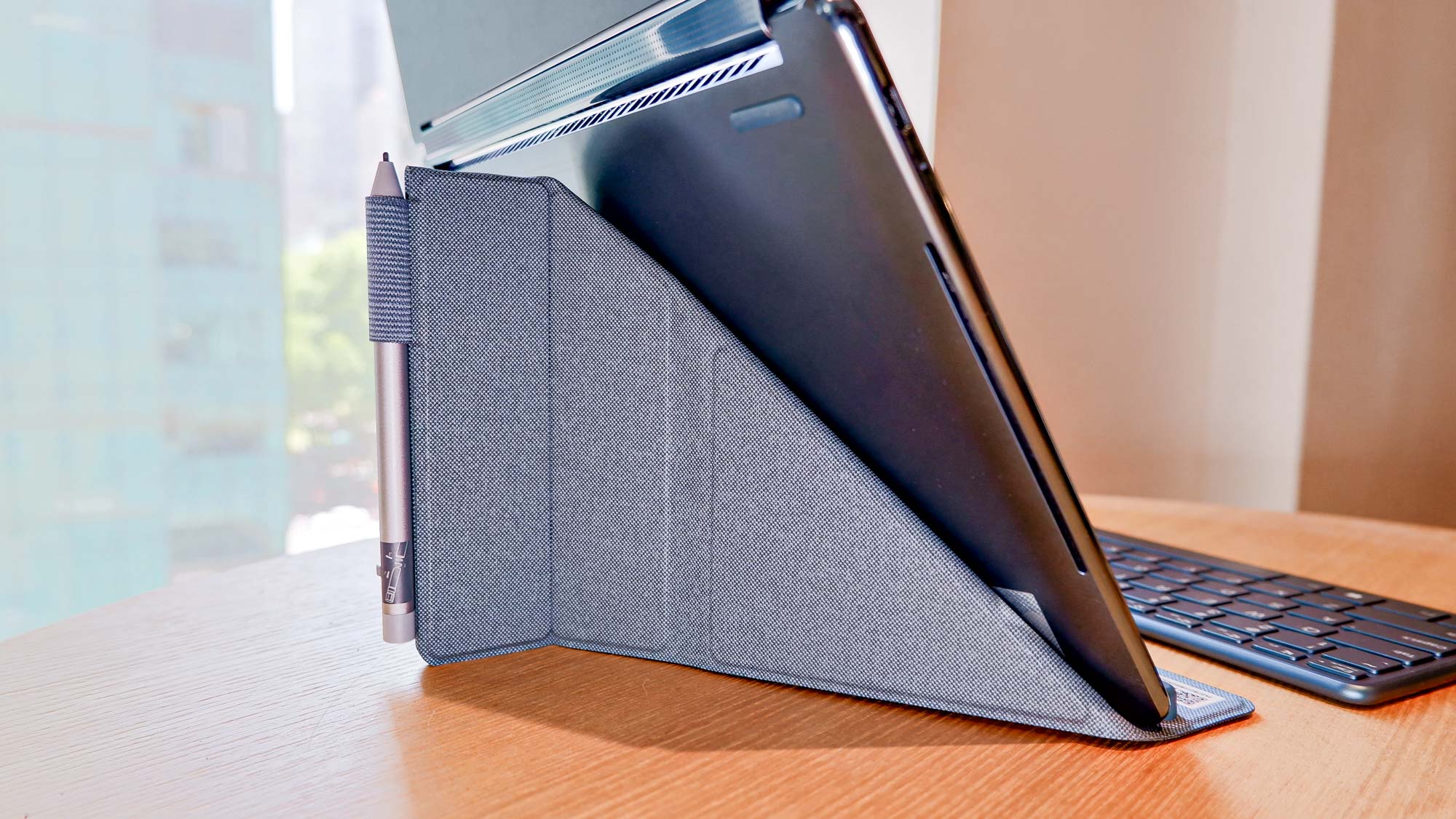
Modern laptops can be stingy with ports, so I’m not surprised the Yoga Book 9i doesn’t feature more. But given how the notebook already comes with accessories, it would have been nice if there was an included USB-A and Ethernet adapter.
Lenovo Yoga Book 9i review: Displays
- Features two 13.3-inch OLED displays
- Displays deliver bright and vivid images
The Yoga Book 9i’s dual-screen design distinguishes it from other laptops, even other 2-in-1s. The pair of 13.3-inch 2.8K (2,880 x 1,800) OLED touch displays are bright and vibrant, providing a clear and crisp picture quality.
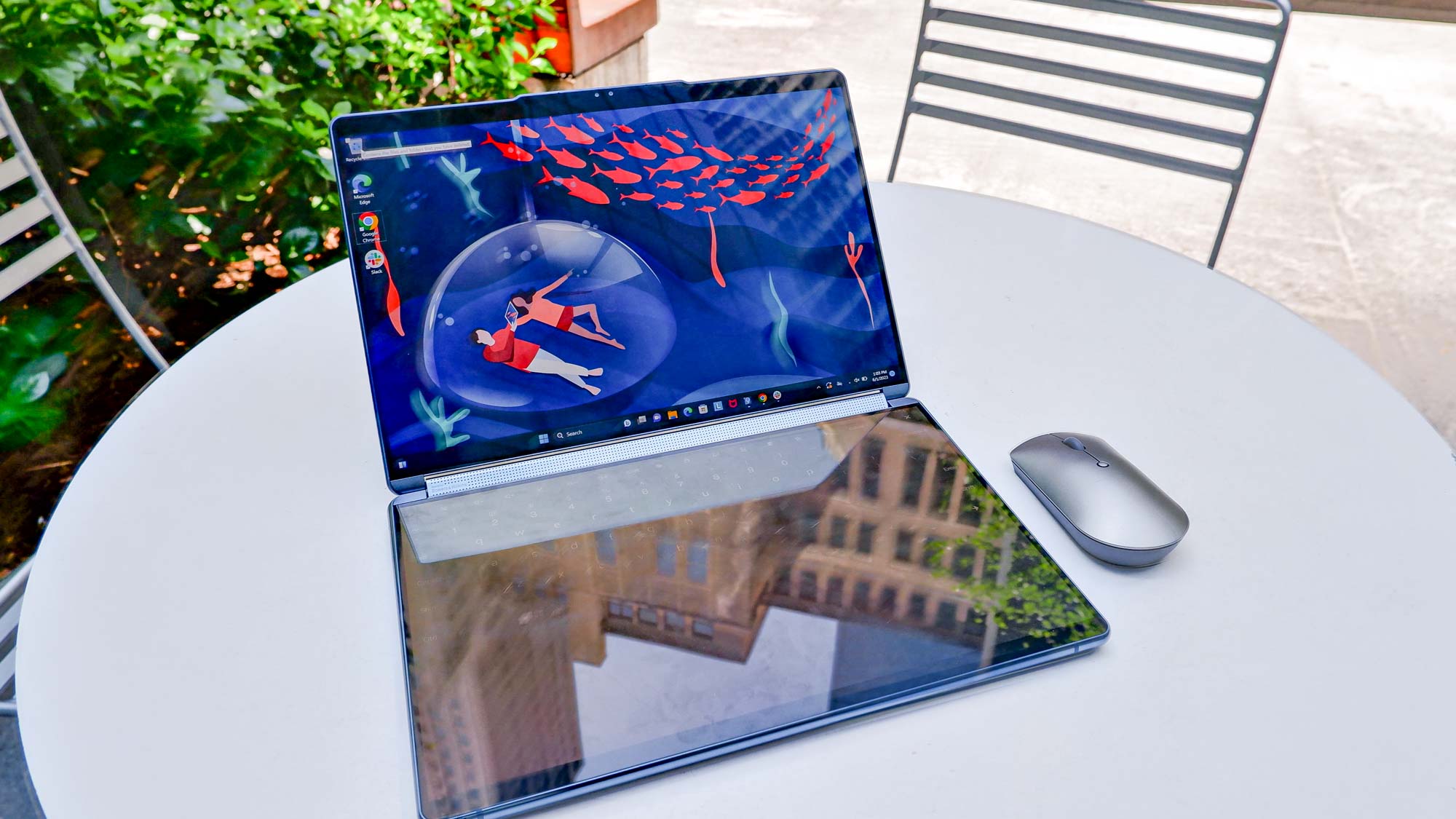
When watching the latest trailer for Transformers: Rise of the Beasts, I was impressed by the vivid colors and sharp contrast between dark and lighter elements. The trailer contains a lot of fast-moving action and quick cuts, but the displays’ 60hz refresh rate ensured everything moved along smoothly.
The included folio stand allows for dual-screen productivity. The Yoga Book 9i has two primary viewing modes: Dual landscape and dual portrait. The former is ideal for activities like videos and web conferencing, while the latter works well for things like word processors, coding or web browsing. You can easily switch between the two modes by turning the laptop to the appropriate orientation.
The touchscreen display never failed to register taps and swipes when I used my fingers. The same is true when I used the included stylus. Fingerprints aren’t too noticeable indoors but become apparent under direct sunlight. Thankfully, you can easily wipe any fingerprints off with a soft tissue.
The dual-screen functionality is the Yoga Book 9i’s main selling point and it functions as advertised. If you’re like me and find yourself constrained by a standard laptop’s single screen, the Yoga Book 9i’s dual screens will be a game-changer. This is especially true since you can orient the laptop for horizontal and vertical content.
| Header Cell - Column 0 | Lenovo Yoga Book 9i | Lenovo Yoga 9i Gen 8 | Samsung Galaxy Book 3 Pro 360 |
|---|---|---|---|
| Nits (brightness) | 335 (display 1) | 343 (display 2) | 353 | 380 |
| sRGB | 193% | 200% | 120% |
| DCI-P3 | 136% | 142% | 85% |
| Delta-E | 0.07 | 0.39 | 0.2 |
How well did the Yoga Book 9i’s displays perform in our lab tests? When we pointed our colorimeter at the displays, we found they achieved 193% of the sRGB color gamut and 136% of the more demanding DCI-P3 color spectrum. Since 100% is most accurate in this test, anything above that value produces oversaturated colors, as was the case with the Yoga Book 9i.
That’s comparable to the Lenovo Yoga 9i Gen 8’s display, which achieved 200% of the sRGB color gamut and 142% of the DCI-P3 color space. However, the Samsung Galaxy Book 3 Pro 360 had better color accuracy, achieving 120% and 85%, respectively.
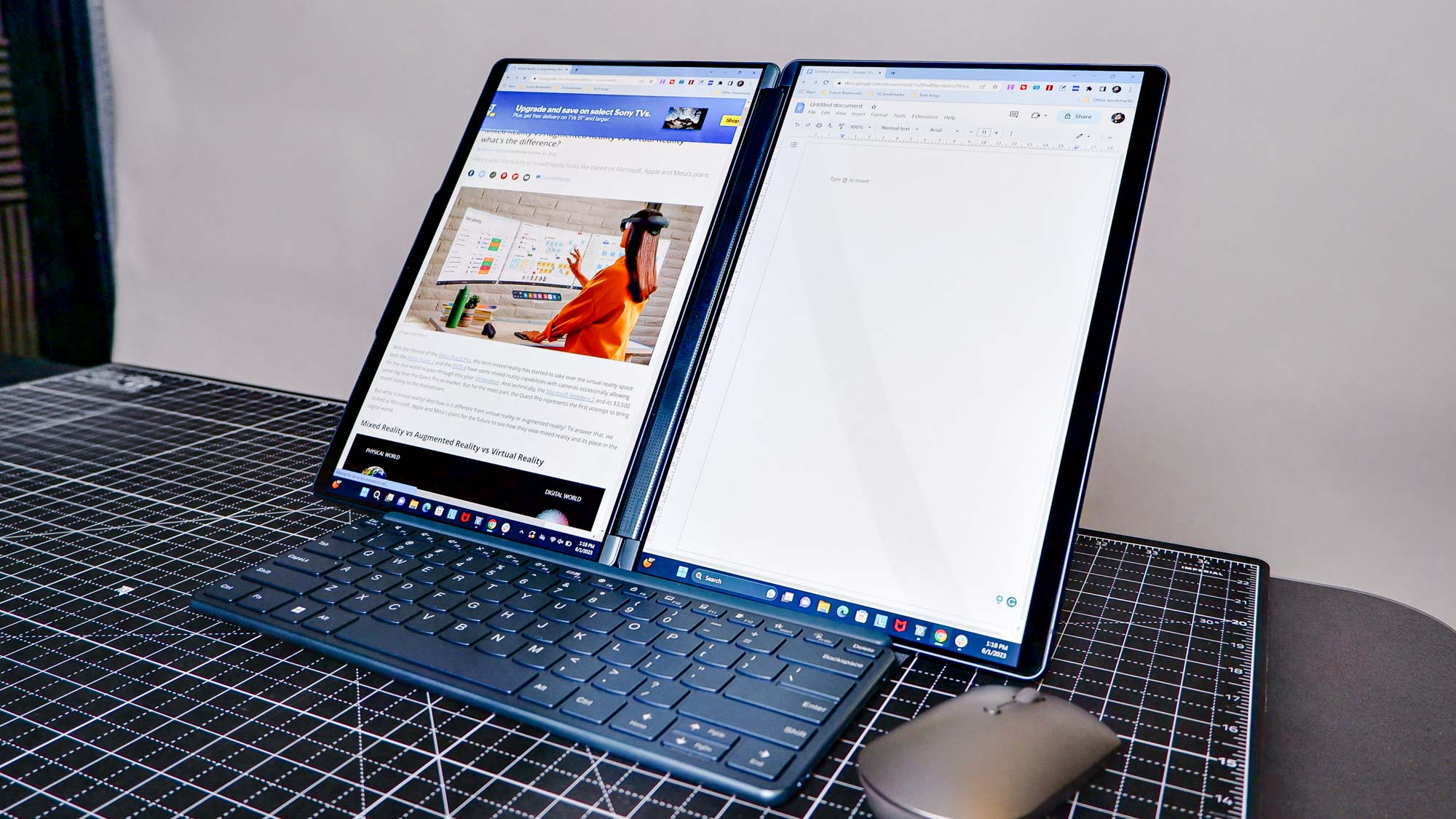
We also found that the top display achieved an average of 335 nits of brightness while the bottom screen achieved 343 nits. That’s dimmer than both the Yoga 9i Gen 8 (353 nits) and Galaxy Book 3 Pro 360 (380 nits). Color accuracy is great, with both screens scoring 0.07 in the Delta-E (where 0 is perfect). As you can see in the chart above, that’s better than its competitors.
The Yoga Book 9i is bright enough when working indoors but I found it too dim for outdoor use. Under direct sunlight, the displays became difficult to see. This is doubly true for the virtual keyboard, which became all but invisible under sunlight. That’s a shame since the Yoga Book 9i would otherwise be an ideal way to enjoy dual-screen functionality outdoors. But so long as you work inside a cafe or restaurant, you’ll be fine.
Lenovo Yoga Book 9i review: Audio
- Bowers & Wilkins speakers
- Clear, loud audio
The Yoga Book 9i features Bowers & Wilkins speakers within its hinge. This includes two 2-watt tweets in the soundbar and two 2-watt woofers on the bottom corners.
The Dolby Atmos-optimized speakers deliver impressive sound for a laptop. The aforementioned Transformers trailer, with its non-stop barrage of explosions, shouting and metal smashing on metal sounded great. Not only did everything come through clearly, there was also plenty of bass to make everything sound punchier.
Music also sounds great. Firewind’s “Welcome to the Empire” is a raucous song, with a barrage of guitar solos, soaring vocals and double bass drums. Every element came through clearly, especially guitarist Gus G’s solos. Whether it’s music or videos, your ears won’t be disappointed by the Yoga Book 9i’s speaker quality.
Lenovo Yoga Book 9i review: Performance
- Fast overall performance
- Slow video editing
The Yoga Book 9i packs a 13th Gen Intel Core i7-1355U mobile CPU, 16GB of RAM and 512GB of SSD storage. These specs are sufficient enough for work and everyday computing. I used the Yoga Book 9i as my primary work computer for a number of days and it had no issues handling my average workflow — which usually involves well over 20 open browser tabs, Slack and the occasional YouTube video.
| Header Cell - Column 0 | Geekbench 6 single-core CPU | Geekbench 6 multi-core CPU | 25GB file copy speed test | Handbrake video editing time |
|---|---|---|---|---|
| Lenovo Yoga Book 9i | 2,405 | 8,523 | 1,296MBps | 9:19 |
| Lenovo Yoga 9i Gen 8 | 2,464 | 1,828 | 1,669MBps | 9:45 |
| Samsung Galaxy Book 3 Pro 360 | 2,337 | 9,858 | 1,173MBps | 7:59 |
The Yoga Book 9i's performance in our testing lab backs up my experience. When we put it to the test in the Geekbench 6 multi-core CPU benchmark it earned a score of 2,405 in the single-core benchmark and 8,523 in the multi-core test. In the single-core benchmark, the Yoga Book 9i holds its own compared to other 2-in-1 laptops we’ve tested. However, both the Yoga 9i Gen 8 and Galaxy Book 3 Pro 360, which have similar specs, outperform it in the multi-core benchmark.
In our video editing test, which tasks the laptop with transcoding a 4K video down to 1080p using Handbrake, the Yoga Book 9i took 9 minutes and 19 seconds. That’s faster than the Yoga 9i Gen 8 (9:45) but slower than the Galaxy Book 3 Pro 360 (7:59). Even if the Yoga Book 9i can perform this task faster than some laptops, 9 minutes is still a bit long.
Moving over to our SSD test, which tasks a laptop with duplicating 25GB of multimedia files as fast as possible. Lenovo’s dual-screen 2-in-1 demonstrated a transfer rate of up to 1,296 MBps. That's faster than the Galaxy Book 3 Pro 360 (1,173 MBps) but much slower than the Yoga 9i Gen (1,669 MBps) by a large margin.
| Header Cell - Column 0 | Sid Meier's Civ VI @ 1080p |
|---|---|
| Lenovo Yoga Book 9i | 33 FPS |
| Lenovo Yoga 9i Gen 8 | 25 FPS |
| Samsung Galaxy Book 3 Pro 360 | 33 FPS |
While the laptop packs enough power for word processing and video conferencing, its integrated GPU will prevent you from playing many modern video games. Still, you can still play some less graphically-demanding titles.
Sid Meier’s Civilization VI: Gathering Storm managed to run at a respectable 33 frames per second at 1080p resolution. That’s on par with the Galaxy Book 3 Pro 360 (33 fps) and better than the Yoga 9i Gen 8 (25 fps). But if you want to do serious gaming on the Yoga Book 9i, I suggest using a game streaming service like Xbox Game Pass or GeForce Now.
Lenovo Yoga Book 9i review: Battery life and heat
- Strong battery life
- Doesn’t run too hot
Despite having two displays drawing power, the Yoga Book 9i has strong battery life.
In our battery test, which involves continuous web surfing with the display at 150 nits of brightness, the Yoga Book 9i lasted for 9 hours and 18 minutes in dual-screen mode. In single display mode, battery life jumps to 12 hours and 13 minutes — which is almost 3 whole hours.
Overall the Yoga 9i Gen 8 (10:10 has slightly longer battery life than the Yoga Book 9i, though the latter outlasts the Galaxy Book 3 Pro 360 (7:46) by a significant amount.
| Header Cell - Column 0 | Time (hours:minutes) |
|---|---|
| Lenovo Yoga Book 9i | 9:18 (two displays) | 12:13 (one display) |
| Lenovo Yoga 9i Gen 8 | 10:10 |
| Samsung Galaxy Book 3 Pro 360 | 7:46 |
In our standard heat test, which involves running a heat gun over the laptop after streaming 15 minutes of full HD video on it, we found the hottest point to be on the underside near the hinge, which peaked at 97 degrees Fahrenheit.
We generally consider temperatures over 95 degrees as being uncomfortable. Since this laptop runs a few degrees hotter than we'd like, we recommend keeping it on a desk or other solid surface instead of your lap.
Lenovo Yoga Book 9i review: Webcam
- 5MP webcam
- Delivers grainy image
The Yoga Book 9i’s 5MP IR webcam is decent enough for video conferencing but don’t expect it to present you at your best.

I took the photo above in our well-lit NYC office. It’s not terrible, but the grainy image quality isn’t flattering. With that said, you can still clearly make out the wrinkles on my shirt. The light coming from the windows appears harsh but the overall color accuracy isn’t bad.
Lenovo Yoga Book 9i review: Software
- Different gestures for specific functions
- Interface is generally responsive
Given its unique design and features, it might not be easy to acclimate to using the Yoga Book 9i. Thankfully, the pre-installed Lenovo Center app has various tutorials that facilitate using the laptop’s various modes. It’s worth your time to fire up the Lenovo Center app.
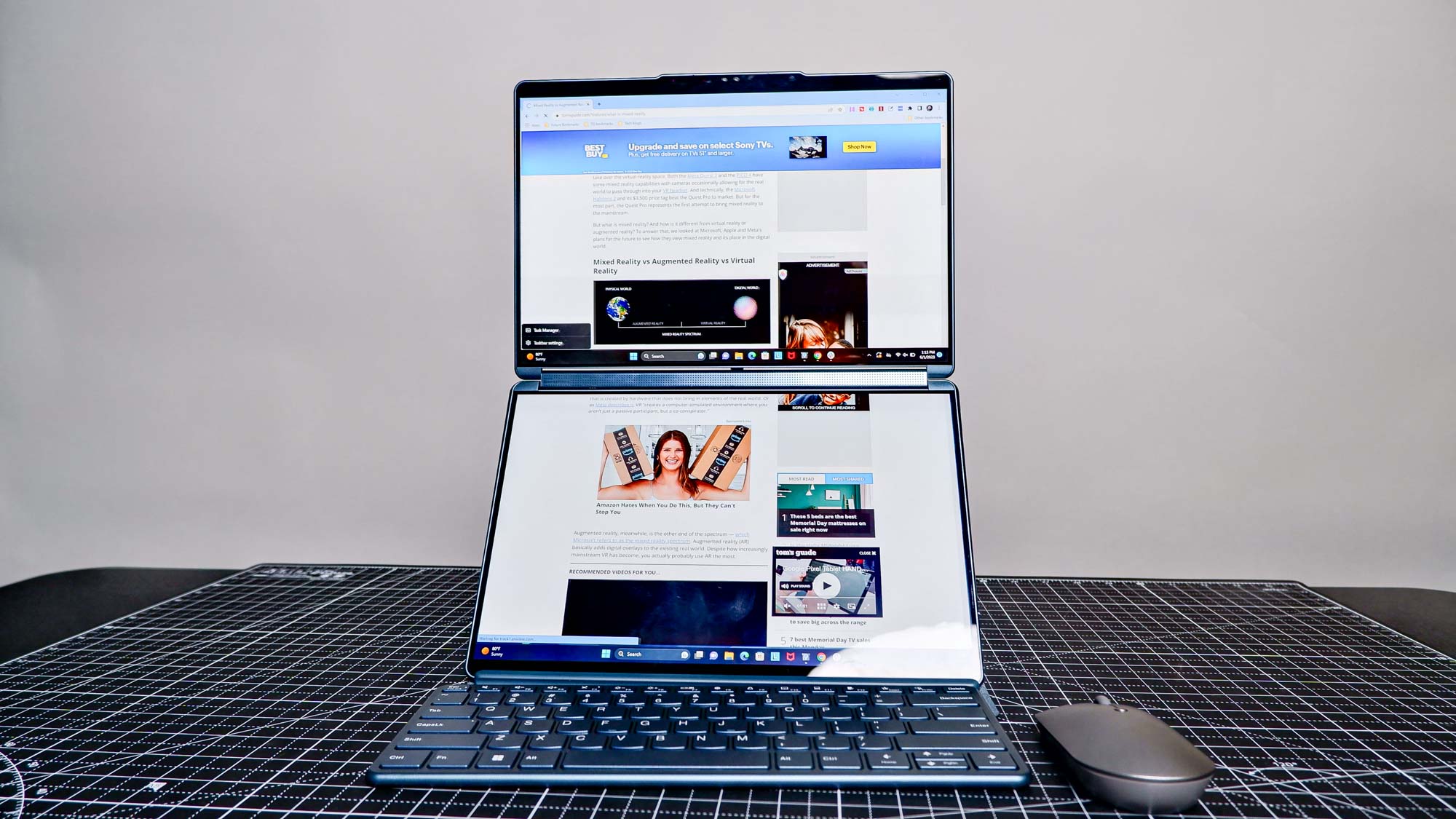
Different gestures perform specific functions. For instance, when using the laptop in dual landscape mode, you can expand a single window or app across both displays by tapping the display with five fingers. You can also drag a specific window to either screen using your finger or the stylus. Performing both of these actions feels natural and there’s no noticeable lag when moving screens around.
You have two options for typing: a virtual on-screen keyboard or the included Bluetooth keyboard. I’ll discuss the physical keyboard in the next section, but first, let’s talk about the virtual keyboard.
Pressing eight fingers on the bottom screen when in landscape mode brings up the virtual keyboard. If you want to use the virtual touchpad without the keyboard, you can bring it up by pressing three fingers on the bottom screen. Using the virtual keyboard takes some getting used to since you’re not tapping on physical keys, though pressing the on-screen keys produces some haptic feedback. You’ll eventually acclimate to the virtual keyboard, though you might not maintain the same typing speed as you would on physical keys.
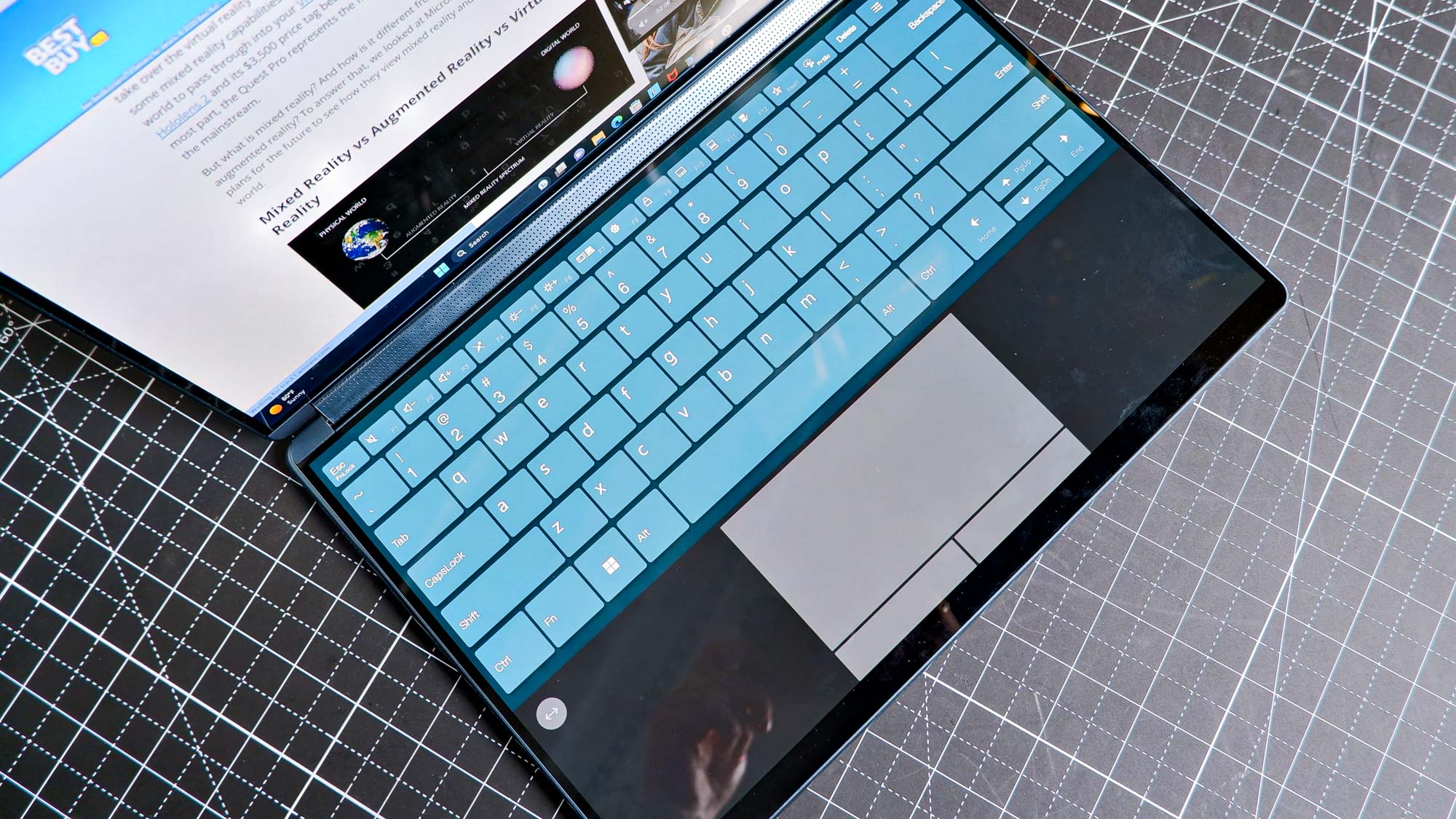
The physical keyboard magnetically attaches to the top half or bottom half of the secondary display. If you place it on the top half, a virtual touchpad appears under the keyboard to provide a more conventional laptop experience. When attached to the bottom half of the display, you can set widgets or snap additional windows to the space above the keyboard.
Using the included keyboard feels more comfortable, but the virtual keyboard works well enough if you have to use it.
Lenovo Yoga Book 9i review: Accessories
- Bluetooth keyboard and mouse included
- Folio stand useful to prop up the laptop
It’s possible to use the Yoga Book 9i without accessories. However, I found that using the included Bluetooth keyboard and mouse delivered a better experience.
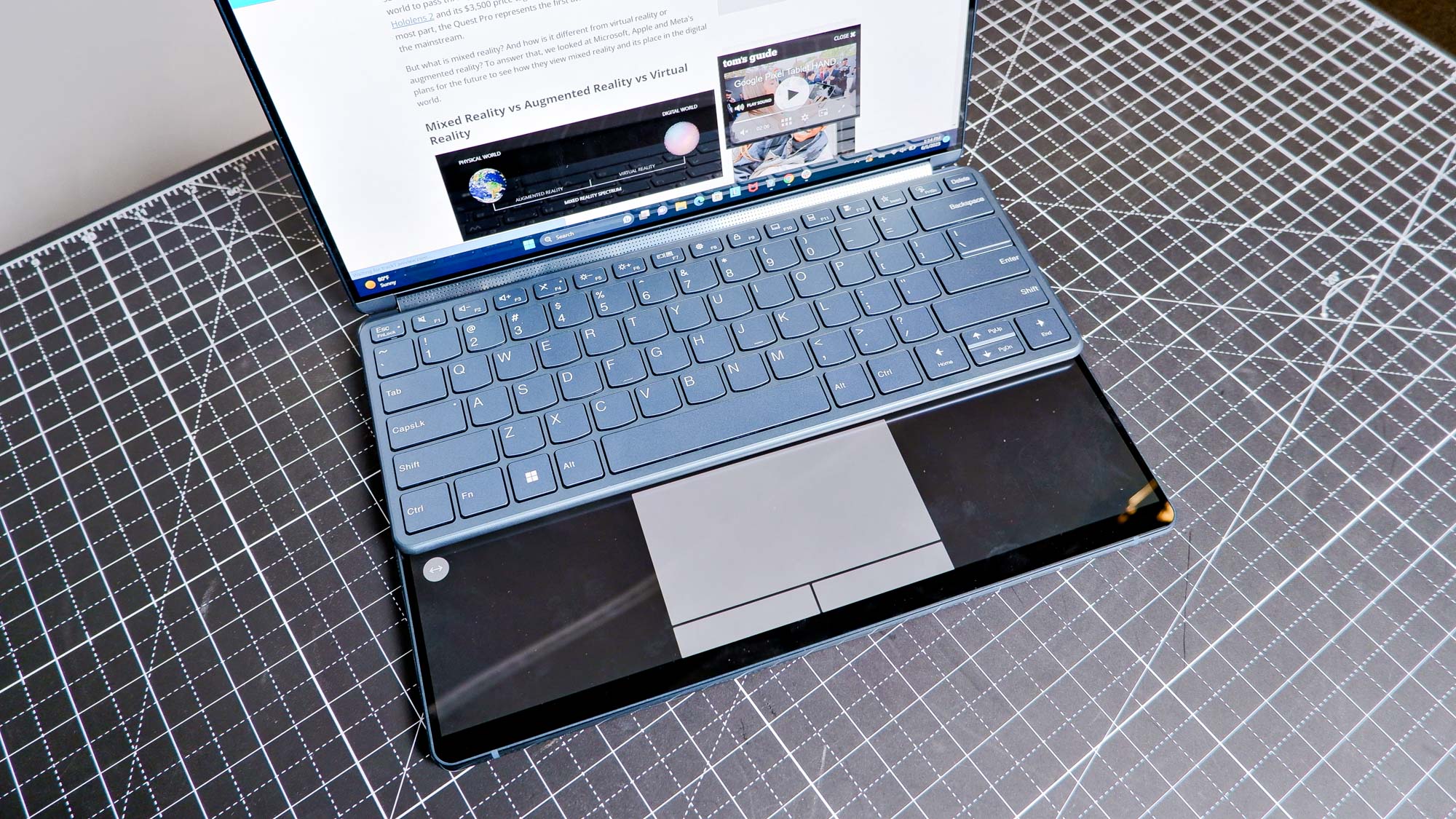
The keyboard magnetically attaches to the bottom screen if you want to use the Yoga Book 9i like a normal laptop. Of course, you can also use the keyboard detached from the laptop thanks to Bluetooth connectivity. The keyboard is decent enough to type on, even if it’s somewhat small for my big hands. When I got used to it, I was able to type almost as fast as I do on a standard-sized keyboard.
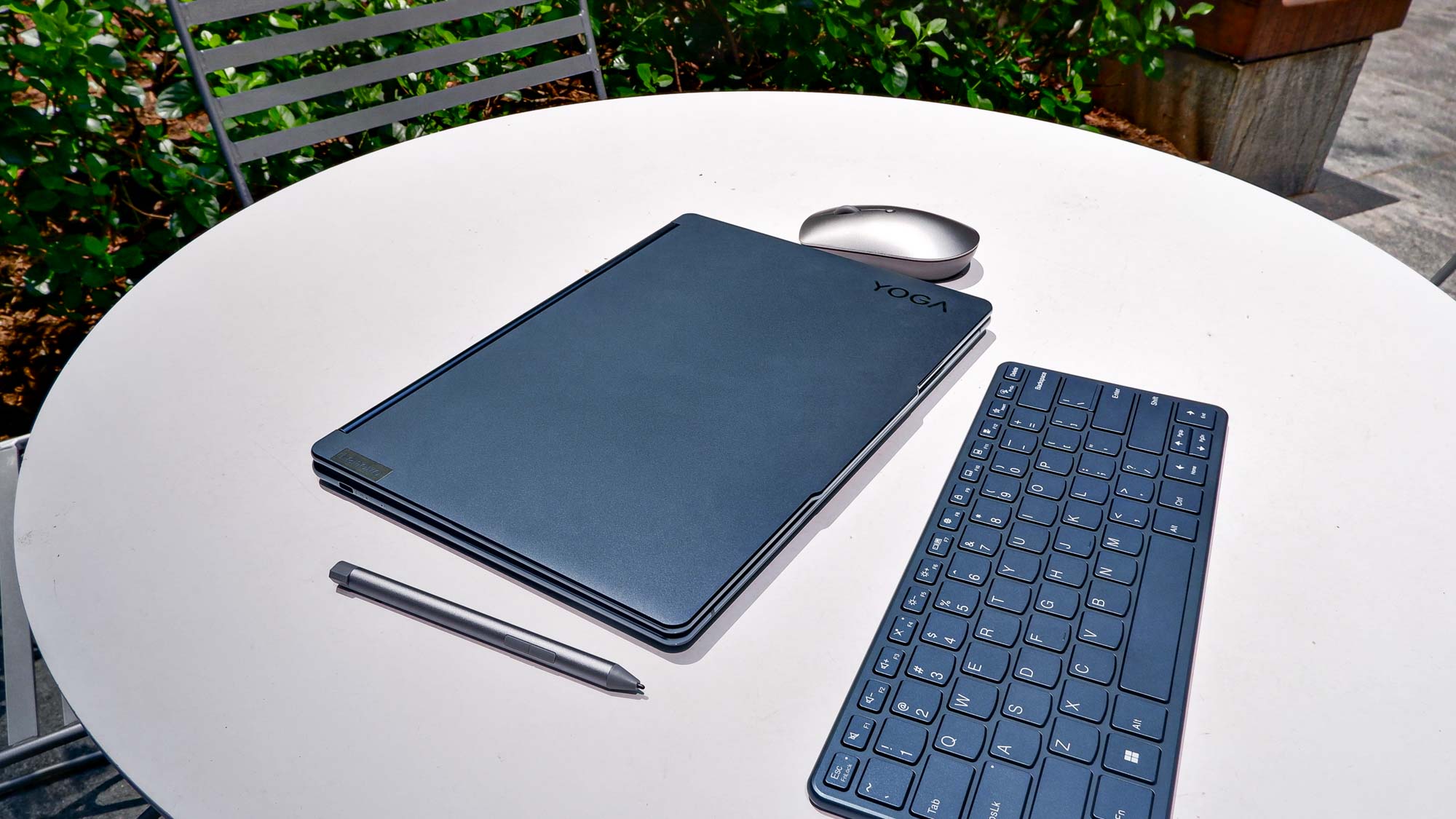
Then there’s the included mouse. Like the keyboard, this peripheral is a tad too small. That aside, the mouse’s smooth surface made it easy to hold and I had no problems moving the cursor along the screens. It isn’t one of the best wireless mice but it gets the job done.
Even if the included accessories are somewhat small, I found the typing and mouse experience comfortable overall. And even if it means carrying around extra items, the keyboard and mouse don’t take up much space in your bag, nor are they heavy.
Lenovo Yoga Book 9i review: Verdict
The Lenovo Yoga Book 9i is an intriguing device due to its unique dual-screen design, and its multitasking capabilities are ideal for folks with large workloads. If you’re like me and have a dual-screen setup at home, the ability to have such usage while outdoors can’t be understated. For some, the Yoga Book 9i could be a huge game-changer.
Though exceptional, the Yoga Book 9i is admittedly expensive. If its price is too steep or you find the dual-screen design gimmicky, the $1,399 Lenovo Yoga 9i Gen 8 is a great 2-in-1 laptop worth considering. The $1,399 Samsung Galaxy Book 3 Pro 360 is also a decent alternative for those invested in the Samsung ecosystem.
Price aside, the Lenovo Yoga Book 9i comes with my strongest recommendation for those who want a simple and portable dual-screen setup.

Tony is a computing writer at Tom’s Guide covering laptops, tablets, Windows, and iOS. During his off-hours, Tony enjoys reading comic books, playing video games, reading speculative fiction novels, and spending too much time on X/Twitter. His non-nerdy pursuits involve attending Hard Rock/Heavy Metal concerts and going to NYC bars with friends and colleagues. His work has appeared in publications such as Laptop Mag, PC Mag, and various independent gaming sites.
